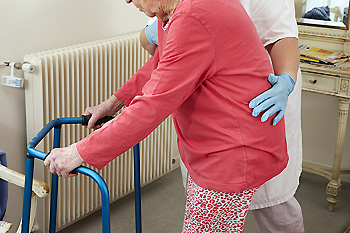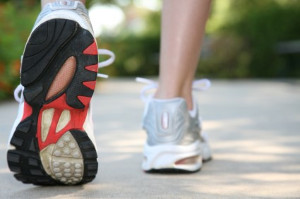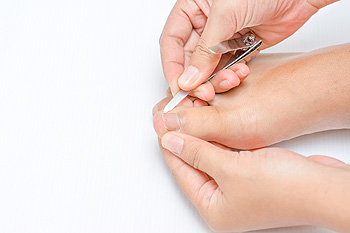
Falls in seniors often start with problems in the feet, toes, or ankles that make walking less steady. Painful joints, reduced range of motion, or stiffness in the ankles can change gait and slow reaction time when stepping on uneven ground. Thickened toenails, numbness, or deformities like hammertoes can affect balance. Additionally, wearing shoes with inadequate support or worn-out flip-flops make slips more likely. Weak muscles in the lower legs or arthritis in the foot joints can cause a shuffling stride, which increases the chance of tripping. Previous injuries, swelling, or poor circulation can also interfere with safe movement, adding to the risk of fractures if bones are fragile. A podiatrist can evaluate the feet, correct gait problems, and recommend proper footwear to improve stability. For help in preventing falls or to address any existing foot problems, it is suggested that you schedule an appointment with a podiatrist for a diagnosis and appropriate treatment.
Preventing falls among the elderly is very important. If you are older and have fallen or fear that you are prone to falling, consult with one of our podiatrists from Highlands Foot and Ankle. Our doctor will assess your condition and provide you with quality advice and care.
Every 11 seconds, an elderly American is being treated in an emergency room for a fall related injury. Falls are the leading cause of head and hip injuries for those 65 and older. Due to decreases in strength, balance, senses, and lack of awareness, elderly persons are very susceptible to falling. Thankfully, there are a number of things older persons can do to prevent falls.
How to Prevent Falls
Some effective methods that older persons can do to prevent falls include:
- Enrolling in strength and balance exercise program to increase balance and strength
- Periodically having your sight and hearing checked
- Discuss any medications you have with a doctor to see if it increases the risk of falling
- Clearing the house of falling hazards and installing devices like grab bars and railings
- Utilizing a walker or cane
- Wearing shoes that provide good support and cushioning
- Talking to family members about falling and increasing awareness
Falling can be a traumatic and embarrassing experience for elderly persons; this can make them less willing to leave the house, and less willing to talk to someone about their fears of falling. Doing such things, however, will increase the likelihood of tripping or losing one’s balance. Knowing the causes of falling and how to prevent them is the best way to mitigate the risk of serious injury.
If you have any questions, please feel free to contact our office located in Waco, TX . We offer the newest diagnostic and treatment technologies for all your foot care needs.

Selecting proper footwear is essential because running places greater strain on the body than walking, making the right support critical for comfort and injury prevention. Walking shoes are designed for steady forward motion and usually offer flexible soles and cushioning for the heel and arch. Running shoes provide more shock absorption, stronger heel support, and added stability to handle the higher impact forces with each stride. Both types should fit well, offer good traction, and match your foot shape and activity level. A podiatrist can evaluate your gait, foot structure, and any pain concerns to recommend the best footwear for your needs. If you have sustained a foot injury from wearing the wrong shoes, it is suggested that you consult a podiatrist who can treat various foot conditions, and guide you on the correct shoes to wear for your desired activity.
For more information about walking shoes versus running shoes, consult with one of our podiatrists from Highlands Foot and Ankle. Our doctor can measure your feet to determine what your needs are and help you find an appropriate pair of footwear.
Foot Health: The Differences between Walking & Running Shoes
There are great ways to stay in shape: running and walking are two great exercises to a healthy lifestyle. It is important to know that running shoes and walking shoes are not interchangeable. There is a key difference on how the feet hit the ground when someone is running or walking. This is why one should be aware that a shoe is designed differently for each activity.
You may be asking yourself what the real differences are between walking and running shoes and the answers may shock you.
Differences
Walking doesn’t involve as much stress or impact on the feet as running does. However, this doesn’t mean that you should be any less prepared. When you’re walking, you land on your heels and have your foot roll forward. This rolling motion requires additional support to the feet.
Flexibility – Walking shoes are designed to have soft, flexible soles. This allows the walker to push off easily with each step.
If you have any questions, please feel free to contact our office located in Waco, TX . We offer the newest diagnostic and treatment technologies for all your foot care needs.

Ingrown toenails are a frequent foot issue where the edge of a toenail grows into the surrounding skin, most often affecting the big toe. The area may look red or shiny, and in more advanced cases there may be drainage, infection, or overgrown skin along the nail border. It often feels sore at first, then progresses to sharp pain, throbbing, and discomfort when walking or wearing shoes. Causes include improper nail trimming, tight or narrow footwear, and genetic factors. A podiatrist can help from the start by accurately diagnosing the condition and determining whether infection is present. Treatment options include proper nail care, reducing inflammation, and relieving pressure. In-office procedures may be employed to remove the ingrown portion of the nail, followed by preventive guidance and long-term solutions in more severe cases. Prompt care helps relieve pain and prevent complications. If you have a painful ingrown toenail, it is suggested that you make an appointment with a podiatrist.
Ingrown toenails can become painful if they are not treated properly. For more information about ingrown toenails, contact one of our podiatrists of Highlands Foot and Ankle. Our doctor can provide the care you need to keep you pain-free and on your feet.
Ingrown Toenails
Ingrown toenails occur when a toenail grows sideways into the bed of the nail, causing pain, swelling, and possibly infection.
Causes
- Bacterial infections
- Improper nail cutting such as cutting it too short or not straight across
- Trauma to the toe, such as stubbing, which causes the nail to grow back irregularly
- Ill-fitting shoes that bunch the toes too close together
- Genetic predisposition
Prevention
Wearing proper fitting shoes and using proper cutting techniques will also help decrease your risk of developing ingrown toenails.
Treatment
Ingrown toenails are a very treatable foot condition. In minor cases, soaking the affected area in salt or antibacterial soaps will not only help with the ingrown nail itself, but also help prevent any infections from occurring. In more severe cases, surgery is an option. In either case, speaking to your podiatrist about this condition will help you get a better understanding of specific treatment options that are right for you.
If you have any questions, please feel free to contact our office located in Waco, TX . We offer the newest diagnostic and treatment technologies for all your foot care needs.

